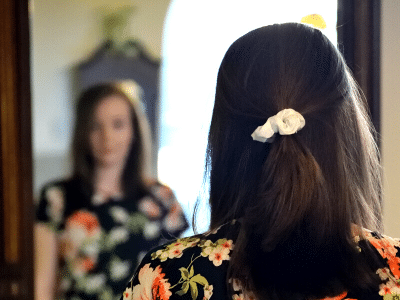

Do you know the true power of vulnerability? Begin by looking at the way you respond when you think about being vulnerable with someone you care for. Does it sound scary, like a chance to be hurt and rejected? Or does it strike you as an opportunity for closeness and connection?
If your main response is fear, you're not alone. It's common to feel like vulnerability is a negative thing – something to avoid.
However, if you refuse to be vulnerable, you actually hold yourself back from the kind of deep relationships that can truly fulfill you.
So, if you're scared of vulnerability, how can you change? The first step is to reframe your understanding of the concept.
In this article, we'll explore the power of vulnerability in relationships.
We'll look at how fear of vulnerability ultimately holds you back in relationships, preventing you from developing true intimacy with another person, and we'll consider the major benefits of being brave enough to be vulnerable with those you love.

Let's start by clarifying what vulnerability really is.
There is a widespread misconception that it's embarrassing – that you ought to feel weak and humiliated if you make yourself vulnerable.
This popular belief completely misses the mark.
In truth, vulnerability simply means choosing not to hide your true feelings from others.
It is to be admired, not mocked, as it requires finding the courage to be authentic and imperfect.
Vulnerability requires strength and the type of honesty that people are too afraid to show.
Seen in this way, vulnerability is beautiful.
As noted above, it's a sad fact about our culture that vulnerability is still seen as weak.
Boys, in particular, grow up hearing this and being told that they can't be “real men” if they share their feelings with others.
But what happens when we try to avoid vulnerability? How do we inadvertently harm ourselves and others?

It's not possible to selectively tune out emotions. So, when you're avoiding vulnerability, you become emotionally numb.
By avoiding contact with feelings like fear and disappointment, you are also out of touch with feelings like joy and excitement.
Emotional numbing deadens our experience of relationships, leaving us experiencing everything at a distance.
The end result is that you do successfully avoid pain, but you do so at the expense of the greatest pleasures life has to offer.

In any close relationship, hiding your true feelings leads to negative consequences.
One example is resentment, which can crop up on both sides. By not fully experiencing – and sharing – hurt, you never air grievances and move past them.
Meanwhile, your partner will be able to pick up that you're holding back, and that leads to its own kind of resentment.
Emotional suppression makes a relationship stagnate, depriving it of the room it needs to grow and improve.

It's not possible to love yourself in a full and meaningful way if you refuse to let yourself be vulnerable.
Working on the nature and power of vulnerability shows that people have a solid sense of self-love and a belief that they deserve love, and deserve to belong.
When you hide large parts of yourself, you don't treat yourself as though your whole, authentic self deserves to be loved and valued.
Naturally, self-esteem plummets as a result.
Self-worth is important and will impact many areas of your life and luckily its something you can work on.
Let's now turn to take a deeper look at why exactly vulnerability offers you so much power and leads to long-lasting contentment.
There are so many wonderful benefits that you can enjoy if you're willing to let yourself be vulnerable – here are three of the most significant.

It's never entirely comfortable to display vulnerability. In fact, it can be downright uncomfortable, and it can be deeply frightening at times.
However, it's necessary to become close to other people and to develop self-acceptance. When you make yourself vulnerable, you put yourself out there with no guarantee.
For example, take saying “I love you” for the first time.
You don't know whether the other person loves you too, or whether they'll say it back. Think of the courage that it takes to make yourself vulnerable like that.
Every time you act courageously, you become emotionally stronger. So, vulnerability promotes strength.

Vulnerability allows you to explore your own emotions.
This, in turn, deepens your understanding of yourself. You learn more about what you need from others, what you value, and what frightens you most.
If practiced often enough, vulnerability allows you to become your most authentic self.
You stop wearing a mask or hiding behind a mask to appease others.
This kind of authenticity allows you to really get to know other people.
And, crucially, being vulnerable also means that any positive feedback and love you receive is directed at your authentic self.
This helps you build confidence and reaffirms your worth.

Connection is one of the most important parts of human life. It plays a major role in our sense of purpose, and helps us to find meaning.
If you won't allow yourself to be vulnerable around other people, you can't really be yourself when you're with them. You don't express your real emotions, and so you deny yourself a chance to make a real connection.
Our most substantial connections are made when we see the damaged, difficult, and most complex parts of each other.
While you don't need to make yourself vulnerable to others, the rewards of showing your vulnerability to a trusted few are enormous.

Now that we've considered why it's so important to take the leap of faith required to make yourself vulnerable, let's think about how you can start to show more vulnerability in your relationships.
This isn't just about romantic relationships – it's just as important to allow trusted friends and family to see your most vulnerable side.
If you find this intimidating or difficult, perhaps because of past pain, try to take small steps. There's no need to rush into vulnerability.
Simply look for moments where you feel comfortable enough to let your guard down a little bit, and slowly start to show more of yourself.

Showing and accepting flaws is key to practicing vulnerability.
Pretending to be something you're not is a reliable way to block connections and intimacy.
There are two important ways to embrace flaws in relationships.
Firstly, admit you're not perfect.
Share some of your struggles, and talk about what you're working on.
Secondly, accept the flaws of others too. Instead of being sycophantic, try to understand the other person’s struggles and embrace their humanity.
If insecurities seem to hold you back from being open, try saying affirmations for confidence in the mirror each morning.
This will help you feel good about yourself and in time get you to open up to the people you care for.

Honesty is another important aspect of developing your vulnerability.
How can your partner really get to know you, for example, your love language, if you are not truly being honest with them.
Honest relationships are much more likely to deepen and stand the test of time.
Pretending that everything is fine is a short-term measure, like putting a band-aid on a major wound. Instead, find respectful ways to raise your worries and difficulties in your relationship.
A moment's discomfort can breed a lifetime of closeness.
In addition, when sources of conflict are addressed at the time, they don't get a chance to turn into long-term resentments.

A third way to develop your openness and vulnerability is to willingly take more risks with your heart.
For example, if you typically pursue relationships that are adequate but distant, try engaging with people who make you feel challenged and excited.
Let them see you, and trust that you can deal with whatever happens as a result.
Taking a chance can be scary, you don't know what the outcome is.
However, it is important to do so as it enables you to live life to the fullest.
The more chances you take, the more you realize that being vulnerable is worth the risk.
We have now explored how the power of vulnerability can open you up as a person and bring forth so many benefits.
There are many things that will help you reach your full potential and showing vulnerability is one of them.
Not only will you grow internally, but being vulnerable by taking risks, sharing your story or honestly communicating with the people around you, can take you places you haven’t thought of before, mentally, and physically.
Want to know more about how you can unlock your full potential? Let this hypnosis guide you there.
